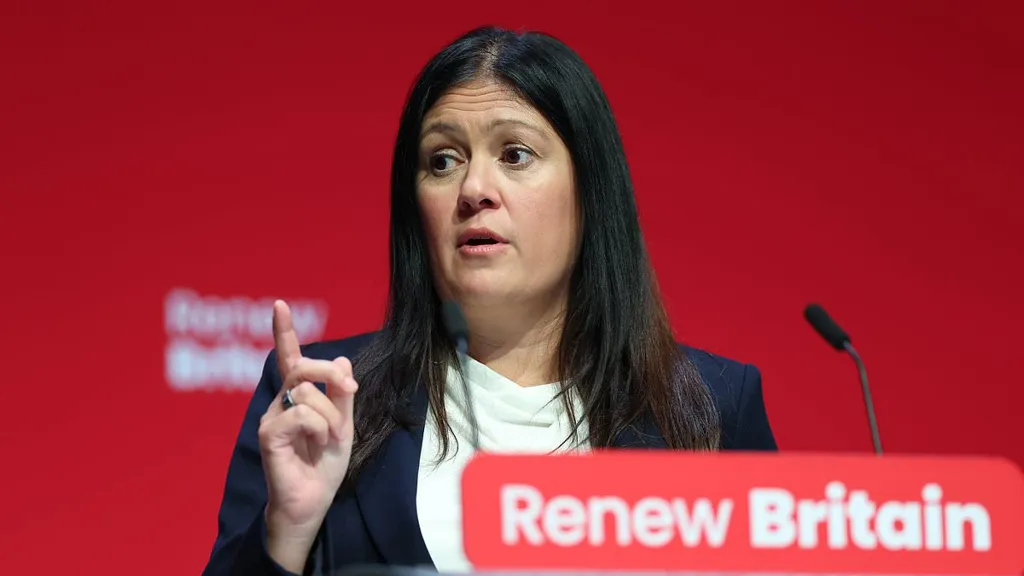The culture secretary has revealed that she is looking at a 'mixed' funding model to replace the BBC licence fee.
During a fringe event at the Labour Party conference in Liverpool on Monday, Lisa Nandy said she was looking at a 'whole range of options' to replace the broadcaster's licence fee.
These include a 'mixture of licence fee, commercial funding and some subscription services', according to The Times.
The move would help protect the broadcaster from future government interference, the culture secretary claimed.
In a veiled swipe at Reform, Nandy also said she ruled out funding the BBC through general taxation as it would be 'far too easy for politicians of any political persuasion to be able to pull that funding in order to use a stick to beat them with'.
The Labour MP for Wigan added: 'It's absolutely essential for me that we protect the BBC from that.'
The licence fee raises around £3.74billion per year which equates to 65 per cent of the BBC's funding. The other 35 per cent comes from commercial activities, grants, royalties and rental income.
But the number of households evading this fee has risen to more than 10 per cent, according to the broadcaster's own estimates.
Lisa Nandy, the culture secretary, has ruled out funding the BBC through general taxation
The cost of the licence fee rose by £5 to £174.50 in 2025. It is due to increase in line with inflation until 2027 as per the terms laid out in an agreement made in 2022.
The government are said to be examining the issue of BBC funding before the current royal charter expires in 2027.
In January, Nandy told BBC Breakfast that the licence fee was 'deeply regressive' and that she would be thinking 'radically and creatively' about how to change it.
It comes as BBC bosses called for the defence budget to be used to help pay for the World Service as aspects of its work are vital for national security, it has been claimed.
Senior executives at the broadcaster are said to be in discussions over whether parts of the radio network's service, such as its anti-disinformation work, should qualify.
In May, it emerged that the Labour government was calling on the BBC to draw up budget plans up to £70million lower than what the broadcaster thinks it needs.
The head of the World Service, Jonathan Munro, is now looking at ways to 'spread the burden' of spending across different departments, The Guardian has reported.
He said: 'There are quite difficult rules about what counts as defence spending, but things that count as stability and conflict spending are now also built into that space.'
The licence fee raises around £3.74billion per year but the number of households evading it has risen to more than 10 per cent, according to the BBC's own estimates
Sources told the publication that the broadcaster is seeking to dip into money from the defence budget, which has recently been increased.
This is due to Prime Minister Sir Keir Starmer's promise of increasing the proportion of GDP spent on defence to 2.5 per cent by 2027.
The BBC's World Service, which delivers news in 42 languages to a global audience, has a £400million budget that is largely funded by the licence fee alongside grants from the government which make up a third of its income.
All grant money is currently taken from the Foreign Office's budget - with 80 per cent of this qualifying as overseas aid.
However, this source of funding was put at risk earlier this year when Starmer called for the aid budget to be slashed in half.
With the Foreign Office's finances being squeezed, corporation bosses are hoping to shift some of their needs over to defence.
They are reportedly calling for the work the World Service does monitoring foreign media and countering propaganda to be seen as vital for national security.
A spokesperson for the BBC said: 'The BBC World Service delivers unparalleled UK cultural influence around the world, and as well as bringing economic benefits to the UK, plays an important role in national security and global stability.
'We are making the case to the Foreign Office about our funding and will continue our discussions with the government.'
